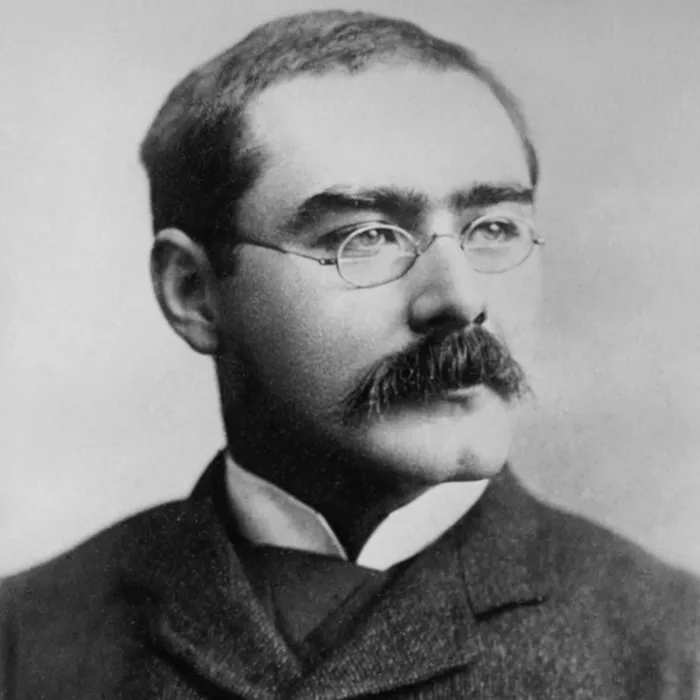
Rudyard Kipling (1865–1936), an iconic literary figure of the late Victorian and Edwardian periods, is renowned for his evocative poems, short stories, and novels. Known for his mastery of narrative poetry and his deep engagement with themes of colonialism, duty, and resilience, Kipling’s works, including If— and The Jungle Book, remain deeply influential and widely studied worldwide.
Rudyard Kipling Biography
Joseph Rudyard Kipling was born on December 30, 1865, in Bombay (now Mumbai), India, to John Lockwood Kipling, an artist and museum curator, and Alice Kipling. Raised amid the vibrant cultural tapestry of British India, young Kipling developed an early fascination with storytelling and language, deeply influenced by the sights and sounds of his environment.
At age six, Kipling was sent to England for schooling, an experience that proved harsh and isolating. The foster home where he lived was strict, and this formative period left him longing for his childhood in India. These early experiences later shaped his nuanced portrayal of colonial life and its complexities.
In 1882, Kipling returned to India and began working as a journalist for The Civil and Military Gazette in Lahore. During this time, he began publishing his first stories and poems, including the early collection Departmental Ditties. His vivid and witty depictions of British and Indian characters gained him local acclaim, and by the late 1880s, he was an established writer.
Kipling’s career flourished after he moved to London in 1889. His collections, such as Barrack-Room Ballads (1892), brought him international fame. Kipling’s works during this time, including The Jungle Book (1894) and Kim (1901), explored colonial themes, human relationships, and morality.
In 1907, Kipling became the first English-language writer to win the Nobel Prize in Literature, recognized for his storytelling craft and his portrayal of imperial ideals. However, his imperialist views drew criticism, particularly in the 20th century as attitudes toward colonialism shifted.
Despite personal tragedies, including the loss of his daughter Josephine to pneumonia and his son John in World War I, Kipling continued to write until his death on January 18, 1936. His works, rich with themes of endurance, identity, and the human condition, remain celebrated today.
Rudyard Kipling Poems
Rudyard Kipling’s poetry is marked by a rhythmic narrative style and a focus on themes of duty, courage, and cultural complexity. Below are some of his most notable poems:
1.“If—”
Perhaps Kipling’s most famous poem, If— is a timeless exploration of resilience, self-control, and moral fortitude, offering advice on living a balanced and honorable life.
2.“The White Man’s Burden”
Written in 1899, this controversial poem advocates for colonial responsibility but is also critiqued for its imperialist undertones.
3.“Gunga Din”
This poem, written in dialect, honors the bravery and humanity of an Indian water-bearer serving British soldiers, blending admiration with problematic stereotypes.
4.“Recessional”
A reflective hymn on the transient nature of power and empire, Recessional warns of hubris and implores humility.
5.“Mandalay”
A nostalgic and romanticized view of colonial Burma, this poem reflects the allure of the East through a soldier’s longing for a lost paradise.
6.“Tommy”
Part of Barrack-Room Ballads, this poem vividly captures the hardships and disrespect faced by British soldiers in civilian life.
7.“The Ballad of East and West”
This poem explores themes of cultural encounter and mutual respect, with the iconic line, “East is East, and West is West, and never the twain shall meet.”
8.“The Law of the Jungle”
Taken from The Jungle Book, this poetic exposition emphasizes discipline, order, and the principles that govern survival.
9.“Epitaphs of the War”
A poignant reflection on the sacrifices of World War I, this collection captures the sorrow and loss experienced during the conflict.
10.“The Glory of the Garden”
A metaphorical poem extolling the virtues of hard work and unity, it reflects Kipling’s belief in diligence and communal effort.
Kipling’s poems, often blending narrative depth with rhythmic precision, capture the tensions of his era, making them complex and enduring literary artifacts.
Rudyard Kipling Quotes
1.“If you can keep your head when all about you are losing theirs and blaming it on you…” (If—)
2.“For the strength of the pack is the wolf, and the strength of the wolf is the pack.” (The Jungle Book)
3.“Oh, East is East, and West is West, and never the twain shall meet.” (The Ballad of East and West)
4.“He travels the fastest who travels alone.” (The Winners)
5.“Gardens are not made by singing ‘Oh, how beautiful,’ and sitting in the shade.” (The Glory of the Garden)
6.“Words are, of course, the most powerful drug used by mankind.”
7.“Down to Gehenna or up to the Throne, he travels the fastest who travels alone.” (The Winners)
8.“Fill the unforgiving minute with sixty seconds’ worth of distance run.” (If—)
9.“God gives all men all earth to love, but since man’s heart is small, ordains for each one spot shall prove beloved over all.” (Sussex)
10.“A people always ends by resembling its shadow.”
Rudyard Kipling Facts
1.Kipling was the youngest Nobel Laureate in Literature at the time, receiving the prize at age 41 in 1907.
2.His birthplace, Bombay, heavily influenced his early works, steeped in Indian culture and colonial life.
3.Kipling popularized the term “jungle law” through his The Jungle Book stories.
4.He declined knighthood and the British Poet Laureateship, preferring to maintain his independence.
5.Kipling’s poem If— was inspired by the actions of British colonial officer Leander Starr Jameson.
6.His home in Vermont, USA, was where he wrote The Jungle Book.
7.He lost his son, John, in World War I, a tragedy that deeply affected his later writings.
8.Kipling coined several phrases still used today, such as “the white man’s burden” and “east is east.”
9.The writer George Orwell praised Kipling’s literary craftsmanship while criticizing his political views.
10.Kipling was buried in Poets’ Corner in Westminster Abbey, alongside other literary greats.
